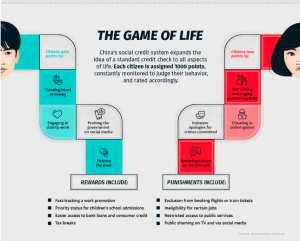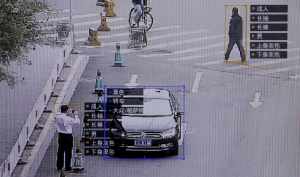The Social Credit System
By Anonymous | September 18, 2020
Many Westerners are familiar with China’s Great Firewall, a tool used by the Chinese Communist Party to monitor, control, and restrict information over the internet inside China’s borders. However, a less well known surveillance practice has been covertly spreading like wildfire in China, and that is the omnipresent surveillance system incorporated into all levels of government, society, and family life. This is the start of what is called the Social Credit System.
The Social Credit System is a point system used to evaluate the behavior and trustworthiness of people and businesses in China. In the picture below, we see some methods to gain or lose points. For instance, if a citizen donates blood or money, or engages in charity work, they gain more points. However, if they don’t visit aging parents, play too much video games, publicly oppose the government, or spread rumors on the internet, that can result in a decrease in points. Everything about the person is used in the calculation of the social credit score, including: daily habits, payments of bills and utilities, locations you visit, online activity, and education.

Methods in which citizens can gain or lose social credit score and possible rewards and punishments.
https://www.visualcapitalist.com/the-game-of-life-visualizing-chinas-social-credit-system/
There are serious ethical factors for this system. Much like having a high Credit Score in the US, there are perks for having a high Social Credit System in China. This includes: easier access to financial services, forgoing deposits on certain rental items, battery visibility on dating websites, and better travel deals. There are serious ramifications, like: restrictions on trains and airplanes, family members being blocked from prestigious schools, denial of social messaging apps, or being unable to pull out a mortgage for a house. And, not to mention the social ostracization that comes from disapproving people around you. An individual’s livelihood is inextricably linked to their Social Credit Score. What restrictions should be considered acceptable and which are not?
The Chinese government is constantly collecting data about individuals, including: financial records, social media activities, credit history, health records, online transactions, tax payments, social network, and location information. There is no option to opt out of the collection process, alter or amend records, or voice concerns over abuse or misuse of the data. There are no laws or regulations that protect the individual over privacy concerns from the government collection and use of their citizen’s data. What should be the line for privacy and legal controls?
This system is made possible by recent advances in technology, big data, and artificial intelligence, such as facial recognition. In addition, the surveillance state created by millions of security cameras, internet watch, interconnected IoT devices, and neighborhood watchdogs ensure that nothing is missed. The government then aggregates all the information into databases and logs that record an individual’s whereabouts and actions; if something new happens, the program automatically sends a notification to the system to ensure that no action goes unrewarded or unpunished.

Artificial intelligence vision recognizing people and objects in the frame.
https://www.pri.org/stories/2018-08-14/laboratory-far-west-chinas-surveillance-state-spreads-quietly
Although this Social Credit System seems to be infringing on many rights Westerners are accustomed to, Eastern societies tend to be focused more on the benefit of the group versus the individual and are more likely to give up certain rights in order to maintain society’s well-being. Several studies have been done to explain the reasons why a proportion of Chinese people support this Social Credit System (https://doi.org/10.1177/1461444819826402). This shows the importance of cultural norms when considering privacy laws, since people of different backgrounds and attitudes might view the balance of security and privacy differently.
The main concern that this system poses is its use to silence societal grievances or governmental opposition. There have been many instances of public outcry against governmental action and policy, such as: political corruption and bribes, poorly built buildings and infrastructure, oppression of ethnic minority groups, and limiting free speech critical of the government. The most notable might be the government’s initial (and possibly continuing) cover up of Coronavirus and persecution of the initial whistleblower, Li Wenliang, for “making false comments” and “spreading rumours” that had “severely disturbed the social order”. When Chinese social media sites fooled with anger at how the government had failed to respond to news appropriately, the sites comments’ were quickly censored. Others may have been deterred for fear of losing social credit points.
Indeed, many political figures, social advocates, or ordinary citizens who have not been inline with the government’s political agenda have been threatened, denied basic services, falsely imprisoned and tortured, coerced to give false testimony, or disappeared without whereabouts. Combined with the omnipresent surveillance state and unforgiving Social Credit System, there isn’t a single individual who isn’t at the mercy of the government’s new way to control society.
Sources:
https://www.washingtonpost.com/news/theworldpost/wp/2018/11/29/social-credit/
https://www.wired.com/story/china-social-credit-score-system/
https://www.youtube.com/watch?v=0cGB8dCDf3c
https://www.bbc.com/news/world-asia-china-53077072
